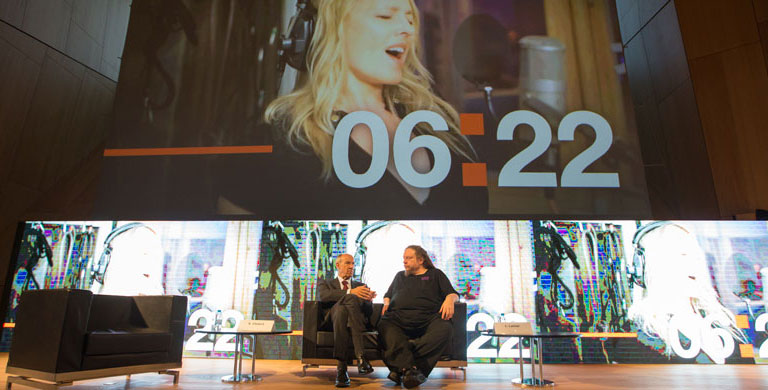Conference on the Global Digital Content Market Opens at WIPO
Geneva,
April 21, 2016
PR/2016/790
WIPO Director General Francis Gurry today opened the WIPO Conference on the Global Digital Content Market, outlining the rising stakes for creators and consumers as new technologies create mass audiences but disrupt business models.
Hundreds of delegates including business, government and creative-industry leaders attended the opening of the two day meeting - a unique global forum for discussions on the tensions in balancing easy access to music, film and other creative works while ensuring creators’ abilities to earn a living.

Mr. Gurry said in opening the conference that he hoped the event would enhance awareness of what is at stake in the evolution from territorial analogue markets to global digital marketplaces.
“This is an exciting and fascinating evolution, with fundamental implications for cultural production in the 21st century,” said Mr. Gurry. “The same features of technology that have produced enormous benefits for consumers have also presented multiple challenges for creators and their business associates. This conference seeks to explore both sides of the impact of the digital transformation on the creative world; the enormous benefits and opportunities on the one hand, and the radical challenges and even threats on the other hand.”
Mr. Gurry said that copyright plays the key role in the financing of culture. “Copyright is the central mechanism in the creation of the market for creative works - if you like, the dominant interface between the world of creativity and the economy. It is the means by which the market exchange of creative works occurs. As such, it is also the principal means for the financing of the production of creative works, enabling the creator to control the commercial exploitation of her works, thereby returning economic value to the creator and ensuring livelihood for the individual creator, and economic sustainability for the creative industries.”
Participants in the conference include Academy and Grammy Award-winning artists, tech entrepreneurs and executives from the publishing industry, as well as WIPO member state delegates.
The keynote address on the first day was given by famed writer, composer and tech futurist Jaron Lanier.
Mr. Lanier began by telling the audience of his evolving views on how creators should harness the evolution of digital technology. He recalled that he once wrote a “fire-breathing editorial” entitled “Piracy Is Your Friend” for a prominent newspaper. But after witnessing the pressures on middle-class lifestyles for musicians, artists, journalists and others from piracy and changing business models, he decided instead: “We are creating victims, this isn’t working.”
He proposed a vastly broadened usage of intellectual property – what he branded “a universal data-rights system” – that would log all data contributions on the Internet by ordinary users, track the usage of these data and direct micro-payments back to the point of origin.
“People have to feel that they are part of a social contract in which they will benefit, as well as spending money. We can’t expect people to only pay, pay, pay and never benefit from the Internet,” said Mr. Lanier.
“Save intellectual property, broaden it, make it much more fine grained, make it much more accessible to more people, make it apply to a million other things including to people whose work patterns help inform industrial robots and factories, anything like that. Broaden it, broaden it, broaden it. Save the middle class,” he said.
Panelists’ discussions, to be moderated by international journalists Mishal Husain and Shaili Chopra, will cover:
- Music - from vinyl to streaming
- Film - sustaining the film industry in the digital environment
- Broadcasting – new models for connection with the audience
- Publishing – the codex in the digital age
- Digital architecture – the soft infrastructure of the global market
- Opportunities and challenges – Markets, Policy and Diplomacy
About WIPO
The World Intellectual Property Organization (WIPO) is the United Nations agency that serves the world’s innovators and creators, ensuring that their ideas travel safely to the market and improve lives everywhere.
We do so by providing services that enable creators, innovators and entrepreneurs to protect and promote their intellectual property (IP) across borders and acting as a forum for addressing cutting-edge IP issues. Our IP data and information guide decisionmakers the world over. And our impact-driven projects and technical assistance ensure IP benefits everyone, everywhere.
For more information, please contact the News and Media Division at WIPO:- Tel: (+41 22) 338 81 61 / 338 72 24